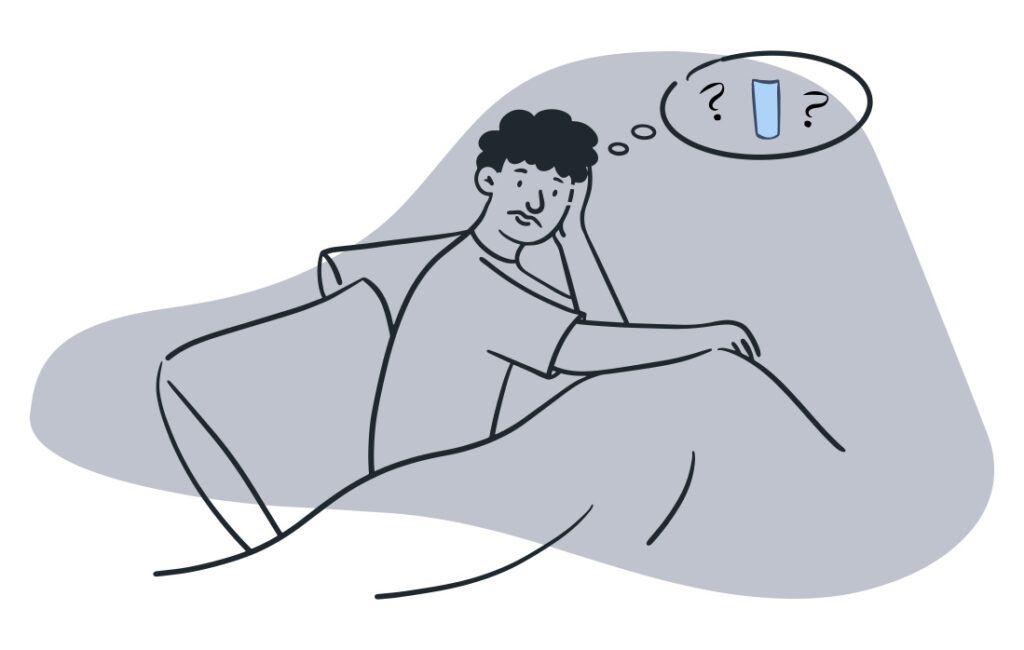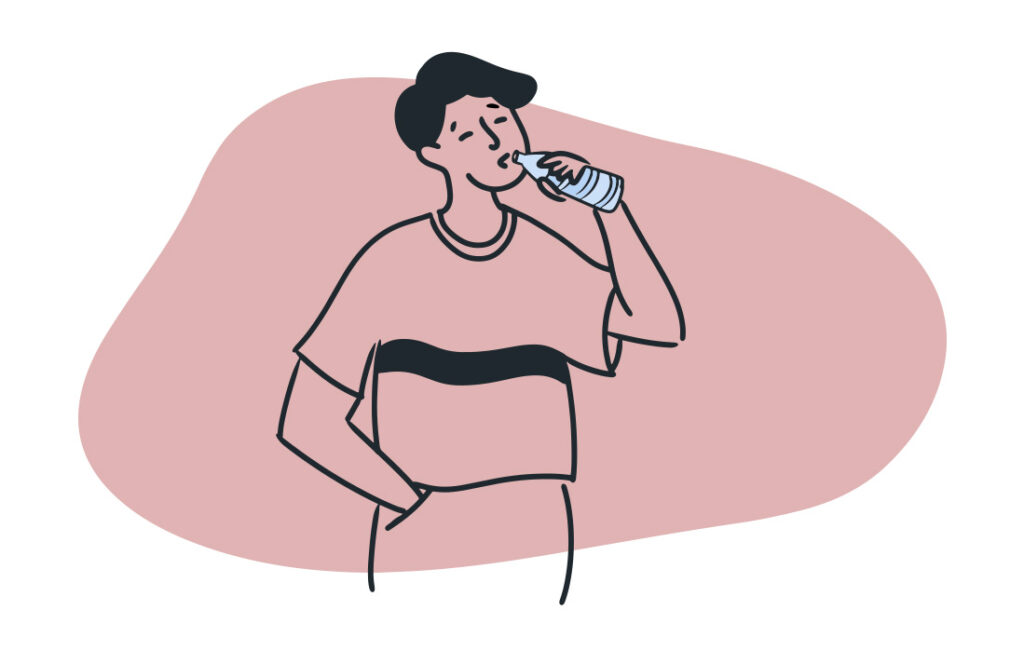Drinking Water Before Bed: Is It Good Or Bad?
Disclosure: By clicking on the product links in this article, Mattress Nerd may receive a commission fee at no cost to you, the reader. Read full disclosure statement.
Expert reviewed by Jordana Tobelem, RD and Wendy Lord, RD.
If you’ve woken up ravenously thirsty, you’re not alone. Many people keep a glass of water at their bedside while sleeping. Some feel it helps them sleep and others just want to satisfy their thirst without having to get out of bed.
But is gulping down some water before bed a good or bad habit? There is science behind hydration and sleep that we’ll look at here. Then you can decide what’s best for you.
Benefits Of Drinking Water Before Bed
Staying hydrated is key (and why all those fancy water bottles are so popular!). Water makes up an estimated 50 to 70 percent of our body. Humans can’t function without it.
You lose water throughout the day and while you sleep. The following bodily activities lead to water loss:
- breathing
- urinating
- passing stools
- exercising
- sweating
The goal is to replenish what water you lose to avoid dehydration. Water helps the body:
- maintain a normal temperature.
- protect its spinal cord and other tissues.
- rid the body of waste.
- lubricate and cushion the joints.
- maintain optimal blood pressure.
- improve mood.

Is It Bad To Drink Water Before Bed?
A little water before bedtime is typically fine. But too much water isn’t a good thing. It’s best to stop drinking water about two hours before bed.
By limiting fluids at night, you can avoid waking up to use the toilet, interrupting that precious sleep cycle, and negatively impacting REM sleep and sleep quality. You may also feel more tired during the day.
Another consequence of drinking too much water at night is bedwetting, also known as nocturnal enuresis. It typically affects children, but adults are also at risk if they take certain medications or live with a health condition that causes it.
A good rule is sticking to only sips of water before bedtime. Too much water may lead to other health concerns. A good way to assess your hydration status is by checking the color of your urine.
Why Should Someone Drink Water Before Bed?
Sipping some water before bed can be beneficial. Especially if the reason you can’t fall asleep has to do with comfort.
For example, if you have a headache (especially a stress headache) or migraine keeping you awake, drinking some water may help. Water may also ease stomach cramps or pain.
Maintaining a cool body temperature can help promote good sleep quality. So, water before bed ensures your body has enough to sweat if you get too hot while sleeping. Sweating helps cool the body down and promotes a great night’s rest.
Finally, the extra water boost may help your body flush out toxins. Urinating and passing stool helps rid the body of waste, making you feel better.

How To Stay Hydrated Throughout The Day
A recent study found that inadequate hydration leads to shorter sleep duration. In other words, if you don’t take in enough water, it can prevent you from getting the sleep you need.
That’s why ensuring you drink enough water throughout the day is so important, among other reasons.
Research also indicates that people often drink more water in the first six hours of their day. But it generally decreases, which may lead to people needing more water.
Wendy Lord, RD, says,“It is recommended to spread the consumption of liquids evenly throughout the day so that the body absorbs water as well as possible. In the ideal case, you should not drink it in full glasses but in continuous sips.”
There are ways to stay hydrated throughout the day:
- Foods. Eating water-rich foods like cucumbers, iceberg lettuce, and celery improves hydration since they are more than 80 percent water.
- Exercise. It’s essential to hydrate before, during, and after working out since you lose so much water when sweating.
- Meals. Drinking a glass of water with every meal is a good practice as it can help you digest food better and absorb more nutrients.
- Mornings. Guzzling water in the morning is a great way to kickstart your day and metabolism.
Consider taking a water bottle with time markers to help you stay on track. You could also drop a lemon wedge or other fruit into the water to help with the taste.
Final Thoughts
Everyone should drink water consistently throughout the day. But you want to avoid drinking large amounts of water at once, especially at bedtime.
Staying hydrated can help improve the quality of sleep you get each night. It may also help improve your mood and energy levels throughout the day.
There are many ways to stay hydrated all day. First, look for foods with high water content, like fruits and vegetables. You’ll also want to ensure you drink a glass of water in the morning and with every meal.
Speak with your doctor if you’re experiencing frequent urination at night or feel overly thirsty. Also, remember that hydration is even more critical in hot temperatures and during exercise.
Sources
15 foods that help you stay hydrated. (2022). https://connect.uclahealth.org/2022/06/17/15-food-that-help-you-stay-hydrated
Arca KN, et al. (2021). Dehydration and headache. https://www.ncbi.nlm.nih.gov/pmc/articles/PMC8280611
Athanasatou A, et al. (2019). Fluctuation of water intake and of hydration indices during the day in a sample of healthy greek adults. https://www.mdpi.com/2072-6643/11/4/793/htm
Belval L, et al. (2019). Practical hydration solution for sports. https://www.ncbi.nlm.nih.gov/pmc/articles/PMC6682880
Is it healthy to drink water before bed? (2022). https://health.clevelandclinic.org/drink-water-before-bed
Liska D, et al. (2019). Narrative Review of Hydration and Selected Health Outcomes in the General Population. https://www.ncbi.nlm.nih.gov/pmc/articles/PMC6356561
Pross N, et al. (2014). Effects of Changes in Water Intake on Mood of High and Low Drinkers. https://www.ncbi.nlm.nih.gov/pmc/articles/PMC3984246
Rincon M, et al. (2022). Nocturnal enuresis. https://www.ncbi.nlm.nih.gov/books/NBK545181
Rondon H, et al. (2022). Hyponatremia. https://www.ncbi.nlm.nih.gov/books/NBK470386
Rosinger A, et al. (2019). Short sleep duration is associated with inadequate hydration: Cross-cultural evidence from US and Chinese adults. https://academic.oup.com/sleep/article/42/2/zsy210/5155420
Water and healthier drinks. (2022). https://www.cdc.gov/healthyweight/healthy_eating/water-and-healthier-drinks.html